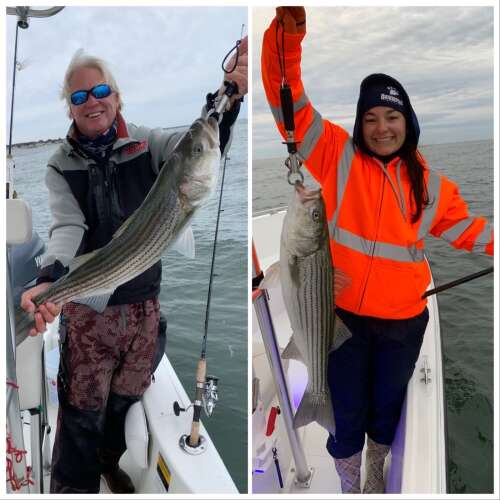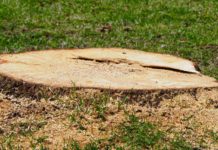Michelle Merwin of North Haven and dad Paul of Madison happened onto an epic school of blitzing striped bass that provided endless local catch and release fishing. Photo illustration courtesy of Captain Morgan
While blue crabs have been dodging recent inclement weather, John Cooney of North Haven knows how, when and where to catch them with regularity. Photo illustration courtesy of Captain Morgan
Joe Kundrath of North Branford fished the waters off Faulkner’s Island where he ran into a school of young black sea bass belonging to this rapidly developing Long Island Sound fishery. Photo courtesy of Captain Morgan
Fishing the marine waters of Long Island Sound and its tributaries in 2022 revealed strange and unusual occurrences. We have seen albies caught in key tidal rivers, epic topwater striped bass blitzes in knee-deep water, untold schools of adult Atlantic menhaden and thick schools of peanut bunker nearshore. To say the least, fishing the briny has been surprising, exciting, noteworthy and educational.
Included in this array of historic phenomena (or shall we say events) rarely encountered, is a local squid run fishable from an inshore dock, in shallow water and quite near to shore. It is not unusual to have a squid run come into the Sound from the Atlantic and Rhode Island waters, however, they commonly remain fairly offshore. But to be able to tie on a squid jig and go squidding from a dock or land is something that is not an everyday occurrence. In fact, it’s something that most old salts cannot remember ever happening.
Yet, this is precisely what this fall season has brought—Loligo or inshore longfin squid. These fast growers are usually less than a foot, are short-lived to under a year and spawn year-round. They thrive near the sea bottom. Juveniles will feed on small crustaceans or krill and predatory marine worms or arrow worms. Adults gravitate to small crabs, shrimp, marine worms, a variety of fish and juvenile squid. Considering the abundance of forage and ideal water temperatures this season, especially near shore, their appearance should not be a total surprise.
Fishing for them is rather straightforward. Attach a squid jig to a light-medium line, drop it to the bottom and give the rod tip a few sharp flicks. Continue with intermittent flicks as the jig is retrieved. Repeat until you hookup and watch out for the ink. Freshly caught to prepare and eat their mild, sweet meat or give up to fishing for striped bass, bluefish, weakfish or a number of other species that thrive on Doryteuthis pealeii, is something to weigh. In either case, they will be gobbled up post haste. Happy squidding!
On the Water
High pressure that moved in shifted farther offshore as a weak frontal system approached. Another high pressure built from the northwest prior to the weekend that also gradually tracked offshore for the weekend. The unseasonable 60 degree days and the 40- to 50-degree nights took their November turn dipping into 50-degree days and 30- to 40-degree nights as Daylight Savings Time came to an end on Nov. 6. Long Island Sound water temperatures ranged from about 58 to 61 degrees while seas remained relatively calm, affected only by a few dense foggy mornings and intermittent gusty winds.
Striped bass blitzes continue with short to slot limit size schools chasing peanut bunker and anchovy-size finfish along beaches, in the bays and lower tidal rivers. These nearshore blitzes are almost occurring with regularity as any fisher who timed it right or happened by could attest. They are not just small schools but are reminiscent of the notable schools seen and fished at Montauk. The majority of catches are and have been made with artificials including swimming jigs, small bucktails, swim baits, topwaters and flies. Do not rule out live eels, chunk baits or squid.
Although linesiders are being caught offshore primarily by the reefs, riplines and passageways, blitzes are numbered and in no way stack up to what has been occurring nearshore and in and around the tidal rivers. Nevertheless, baitfish remain plentiful, mild temperatures have stretched out and considering November’s start, a real bonus for catching/releasing one of the Sound’s most popular fish.
As with the striped bass, bluefish have ramped up their game as well. Their fall run is in full swing as choppers in double-digits are cutting leaders, slashing topwater poppers, chasing spoons, biting diamond jigs and eating chunk baits, shad, menhaden and silversides. Breaking out your 10 wgt, armed with a topwater fly attached to a wire-tipped leader can result in some serious hookups when a school is feeding on top. When trolling, do not rule out hooking into a weakfish or two.
The albie hunt is on throughout the Sound with emphasis on its eastern and western sectors. Catches are being made using spinning and fly gear. Emphasis is placed on leading a foraging school, employing fast retrieves using small epoxies, metal swimmers and jigs that best imitate anchovy size rainbaits. Consider a heavier jig and taking your search to depths of around 40 to 60 feet when they disappear from the surface. One might be surprised how often that tactic will pay off.
The Sound’s bottom fishery is in tune with the mild weather and, for the most part, cooperative seas and tides. Porgy catches are up yielding mixed sizes on many of the nearshore reefs and humps with better catches coming from the deeper structures. Quality black sea bass can be found in 90- to 110-foot depths — although keeper catches can be hooked in 40 to 60 feet. Scup and sea bass hit squid added to appropriate rigs and/or jigs. FYI: dogfish, sand sharks, sea robins, northern kingfish, gray triggers and toadfish are still around. Fishing the estuaries for hickory shad, consider bringing your crabbing gear. Blue crabs remain active and good ones are being caught!
However, considering that blackfish (tautog) season is in full swing, that fishery is taking over the conversation when it comes to the walls, jetties and rock piles. Water temperatures still remain on the warmer side but as they cool down, proportionately, the bite will move up a notch from an already productive fall season. Whole or partial crabs attached to jigs and rigs as well as a good hand are key to a successful day.
This mild November weather is creating the opportunity for anglers to move back and forth from the sweet to the briny water. Sometimes it is because of weather and other times it is because of available fishing opportunities. From trout, salmon and catfish in the rivers to foraging species from largemouth bass to panfish including black crappie in the lakes and ponds, fishing has been atypical.
Note: Email us pics of your catches to share with our USA and international fishing friends who keep up with the latest fishing news and frequent social media.
For all things fishy including the latest gear, flies/fly fishing, rods/reels, clam/crabbing supplies, fishing trips, licenses/permits and much more, swing by the shop (203-245-8665) open seven days located at 21 Boston Post Road, Madison. Until next time from your Connecticut shoreline’s full-service fishing outfitter, where we don’t make the fisherman, we make the fisherman better.
Tight Lines,
Captain Morgan
captainmorganusa@hotmail.com
captainmorgan-fish.blogspot.com
twitter @captmorgan_usa
Credit: Source link































